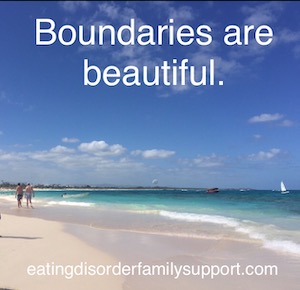 Falling prey to all of the chaos and fear of the eating disorder (ed) is common, even to be expected. Learning to live in-tune with our own desires, needs, and feelings and set boundaries aligned with our values takes intentionality and support.
Falling prey to all of the chaos and fear of the eating disorder (ed) is common, even to be expected. Learning to live in-tune with our own desires, needs, and feelings and set boundaries aligned with our values takes intentionality and support.
Boundaries are not cruel, they’re COOL!
- They empower us and our loved ones.
- We gain time and energy to more effectively support our loved one in recovery.
- They keep us and our loved ones safe.
If you love or care about or know someone who is in recovery from an eating disorder you may be feeling or have felt; fearful, helpless, overwhelmed, afraid, upset, and more. And if your loved one is over 18 you might fear there is nothing you can do to help them with recovery from one of these deadly brain illnesses. There is an endless list of things to fear; when they will eat next, when they might purge again, when insurance will cut them off, will they be able to attend school or work, will they die?
Fear keeps us stuck. It’s time to send those fears on a hike! There is plenty you can do!
FEAR can lead to SILENCE, INDECISION and KEEPING OUR CHILD SICK.
Make sure you’re included in the treatment plan! Most treatment centers now include parents as part of the team and have options for learning how to help your child. We often empower family caregivers to step into this role.
Educate yourself on eating disorders. The more you understand, the more competent and confident you will be in staying calm and not letting fear take hold. It will empower you and give you hope as you learn that there are effective treatments. Please hold onto HOPE, this will not be a smooth journey.
Do your part to preserve your sanity and health, this helps you remain calm so you can actively preserve the relationship. Eating disorders can destroy relationships as well as lives. Remaining calm doesn’t mean it is going to be all wine and roses, but you can do your best to show the person in recovery that they are loved and protect yourself in the meantime by setting limits on what will will allow others to do to us. Not an easy task with someone who often thinks they are unlovable and has their thoughts distorted by the eating disorder.
I know I am in control of myself and my experience and that I’m not in control of other people and their experiences.
When we can be calm, emotionally objective and confident in our decisions we can then cope with the wild things the eating disorder will throw at us. Easy to say, hard to do. Keep reading, we’ll get you on the right path. You may need some extra support with this and that’s fine. We have parent support programs to help with that. Self-care is essential. It is not selfish! Doing things that fill you up actually helps you and your child. We will talk about the value of validation and effective communication in another blog post.
Here is an example of a situation a parent might be facing:
“My child with bulimia also abuses alcohol and is stealing. I know he needs treatment for his eating disorder so I keep rescuing him when he shoplifts. I’m getting bitter and angry about constantly bailing him out with money but I’m so afraid if he goes to jail he won’t get the treatment he needs.”
The fear and lack of boundaries around what this parent is willing to set limits on are leading to them being taken advantage of and as a result, the child isn’t getting any better and the parent is becoming bitter and angry. This is not helping anyone.
We can become so used to verbal abuse and disrespectful treatment from the eating disorder that we begin tolerating inappropriate behaviors. Once we come to grips with our fears and accept that boundaries aren’t cruel and punitive then we can begin to set limits. And reclaim our power and some HOPE.
Once we come to grips with our fears and accept that boundaries aren’t cruel and punitive then we can begin to set limits. And reclaim our power and some HOPE.
I get it, setting limits takes time and energy that we don’t have. And in the long run, limits in alignment with our values, give us more time and energy. Setting and enforcing boundaries are loving acts that keep our kids safe. It takes consistency to enforce them, especially when we haven’t in the past.
Remember having a 2 year-old that wanted to run out into the street? We didn’t let them even if they screamed or cried. There is no way we would would let them endanger themselves like that. It’s no different now, the stakes are much much higher though.
When we take the time and energy to set limits and enforce them, we gain so much time and energy as well as protecting our child.
It may better serve the parent in the example to instead of bailing him out say, “I will finance your treatment to save your life and I will no longer finance bailing you out if you shoplift again.”
We don’t want our child to live forever in an “almost anorexic” or “almost recovered” state as that would be much more painful and cruel in the long run than making the tough decisions to draw the line in the sand now.
These choices can save their lives.
Often with teens and young adults in recovery we must bravely use whatever leverage we have to set boundaries that keep them safe. This might be letting them know the limits and rules for having the privilege of having a cell phone. Or using the car, or going to college. It can be really hard to say these things, and they can be life saving. “We will pay for more college when the medical providers say that you’re medically stable and you’ve been in solid recovery for six months.” Scary to say. They will NOT like it and may make threats. It’s a matter of trusting your gut about what needs to happen to keep them safe.
These are tough boundaries to enforce and they will most likely get angry with us. This means they’re learning they cannot use us anymore. Until we are consistent and stay firm the ED will continue to take advantage of us. And they often will continue resisting taking the recovery steps they need to take.
If you’re ready to get support to sort out what boundaries you can live with, contact us. No one should have to do this alone.
Boundaries can bring; HOPE, PEACE, CALM, HEALING and JOY!

